June 21, Sunday. I have three telegrams from Dr. Whelan to-day, all of the same tenor. The last, at 4 P.M., says Admiral Foote continues much the same, — insensible and slowly sinking. Dahlgren, who left New York yesterday, says the case is hopeless, that Foote told him it was the last of this world and he was prepared for the event.
We have pretty authentic reports of a protracted fight at Aldie. The War Department is not communicative, and I apprehend for the reason that it is not better advised than the rest of us, as yet. A train of ambulances passed this evening, going, I doubt not, for the wounded.
The Richmond papers speak of the capture of the steamer Fingal by our ironclads. This is important, and I am inclined to credit it. John Rodgers has written his family that he was in Nassau Sound, having been ordered there to watch the Fingal. The Richmond report corresponds with this, and states she was captured after a fight of thirty minutes with the monitors.
I had to-day a full and unreserved talk with Dahlgren. Told him it was now evident Foote could not go on the service to which he was ordered, — at all events, if he survived, not for the present; I should therefore designate him to relieve Du Pont. This would, to some extent, involve the selection of a new staff, for it was not likely that Foote’s confidants were his confidants. [I remarked] that not unlikely some of the elder officers who had seen great sea service would feel disinclined to remain on the station under him; that in giving him this command I was consulting the wishes of the President; that to supersede Du Pont, under any circumstances, involved some risk and responsibility to both the Department and the recipient; that he could not be unaware his promotion had caused some discontent, and that it would not be lessened by this command. If any of his seniors in past times desired to be transferred, they must be permitted to do so, without prejudice.
I stated that this appointment was a specialty, imposed upon the Department by Admiral Foote’s affliction when on his way to assume these duties; that this interruption made prompt action necessary; that he had sought the privilege of leading in the assault on Sumter under Du Pont; that I had proposed him as an assistant and second to Foote; that he was to go for a particular purpose, and his absence from the Bureau would therefore be temporary. In the mean time, Commander Wise, the assistant who had been associated with him, could take charge of and go forward with the ordnance duties as well as, and perhaps better than, any one else. To all this he assented, but expressed a strong wish that a new appointment might be made, and he entirely relieved from the Bureau. I replied that I could not for a moment think of relieving him of charge of the ordnance, nor ought he to ask, or be willing, to relinquish it; that was his place, to which he had been educated and for which he had aptitude, and it was my wish he should retain his position as Chief of the Ordnance Bureau during my connection with the Department.
As related to any demonstration on Charleston, should any be made, he was to consider himself clothed with full powers, and to prescribe details, communicating at all times and without reserve to the Department; to let me have not only all the good news but any bad news, and to tell me frankly at any time of embarrassments, change of views, or difficulties of any kind.











